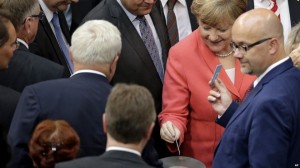The German parliament has voted in favour of starting negotiations on Greece’s €86bn (£60bn) bailout deal.
The motion passed with a clear majority, with 439 MPs in favour, 119 votes against and 40 abstentions.
Prior to the vote, Chancellor Angela Merkel warned of “predictable chaos” if the Bundestag did not back the plan.
The Greek parliament has already voted in favour of the hard-hitting austerity measures required by the eurozone for a third bailout deal.
On Thursday, the European Central Bank (ECB) raised the level of emergency funding available. This has paved the way for Greek banks, which shut nearly three weeks ago, to reopen on Monday.
But credit controls limiting cash withdrawals to €60 a day will only be eased gradually, officials say.
Separately on Friday, the European Council approved a €7bn bridging loan for Greece from an EU-wide emergency fund. The loan was approved in principle by eurozone ministers on Thursday, but required consultation with non-euro states.
It means Greece will now be able to repay debts to two of its creditors, the ECB and International Monetary Fund (IMF), due on Monday.
It’s German Chancellor Angela Merkel’s 61st birthday – but don’t expect a celebratory mood in the Bundestag.
The German parliament has voted in favour of the proposal. But the mood is ugly. Forty-eight of Mrs Merkel’s conservative MPs had indicated in advance that they would defy her. Others went along with the party line but grudgingly; many here struggle to justify a third bailout to taxpayers in their constituencies.
This morning a poll revealed 49% of Germans don’t want to enter talks over the deal.
Finance Minister Wolfgang Schaeuble can expect a tough time too; his notoriously hawkish stance has upset some MPs who worry that Germany’s reputation has been damaged as a result.
Interestingly, Mr Schaeuble used an interview on the eve of the debate to raise the prospect again of a temporary Greek exit from the eurozone.
Chancellor Merkel told MPs ahead of Friday’s vote that the deal was hard for all sides, but said it was the “last” attempt to resolve the crisis.
“We would be grossly negligent, indeed acting irresponsibly if we did not at least try this path,” she said.
According to Reuters, 60 members – almost a fifth – of Mrs Merkel’s conservative Christian Democrat party voted against the motion.
Austria’s parliament voted in favour of negotiations earlier on Friday, before the outcome of the German vote was announced.
Germany and Austria are among several eurozone states requiring parliamentary approval to go ahead with bailout talks. France and Finland have already backed the negotiations.
Meanwhile, there have been fresh calls for Greek debt relief measures from International Monetary Fund (IMF) chief Christine Lagarde – echoing a call from Greek PM Alexis Tsipras.
Ms Lagarde told France’s Europe 1 the IMF would participate in a “complete” Greek package that includes debt restructuring, as well as an “in-depth reform” of the Greek economy.
Greece has debts of €320bn and is seeking its third international bailout. Last month it became the first developed country to fail to make a repayment on a loan from the IMF.
The bank closures have been one of the most visible signs of the crisis.
From Monday, a weekly limit on withdrawals may replace a daily cap, Greek Deputy Finance Minister Dimitris Mardas suggested.
“If someone doesn’t want to take €60 on Monday and wants to take it on Tuesday, for instance, they can withdraw €120, or €180 on Wednesday,” he told Greek ERT television.
VAT increase
The announcements from the ECB and the Eurogroup came after Greek MPs passed tough reforms on taxes, pensions and labour rules as part of the new bailout deal.
A rise in value added tax (VAT) from 13% to 23% will kick in on Monday, affecting food and drink in restaurants, taxi fares, selected supermarket items, public transport and plane and ferry tickets.
Greek Prime Minister Alexis Tsipras faced opposition to the deal from MPs within his left Syriza party. He is widely expected to announce a cabinet reshuffle on Friday.
BBC
 Q FM Africa's Modern Radio
Q FM Africa's Modern Radio
